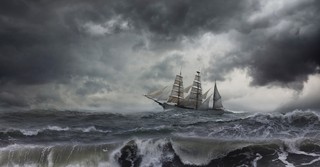A Hard Lesson from Jonah – the Man Who Ran
Share

“Jonah had gone out and sat down at a place east of the city. There he made himself a shelter, sat in its shade and waited to see what would happen to the city. Then the Lord God provided a leafy plant and made it grow up over Jonah to give shade for his head to ease his discomfort, and Jonah was very happy about the plant. But at dawn the next day God provided a worm, which chewed the plant so that it withered. When the sun rose, God provided a scorching east wind, and the sun blazed on Jonah’s head so that he grew faint. He wanted to die, and said, ‘It would be better for me to die than to live.’ But God said to Jonah, ‘Is it right for you to be angry about the plant?’ ‘It is,’ he said. ‘And I’m so angry I wish I were dead.’ But the Lord said, ‘You have been concerned about this plant, though you did not tend it or make it grow. It sprang up overnight and died overnight. And should I not have concern for the great city of Nineveh, in which there are more than a hundred and twenty thousand people who cannot tell their right hand from their left—and also many animals?’” (Jonah 4:5-11).
And this is how the book of Jonah ends. Not with a “happily ever after,” rather, the story of Jonah ends with the prophet becoming frustrated, sun-scorched and throwing a pity party.
It was probably not the greatest moment in his prophetic career.
Jonah was a man, a prophet called by God, who ran from the assignment that God had given him. He was the ultimate backslider.
God had said to Jonah: “I want you to take My word of warning to your enemies because I will soon destroy them if they don’t repent.” But Jonah knew God was loving and merciful, and if his wicked enemies actually repented, these undeserving, knuckle-dragging enemies of Israel would get off scot-free! And what Jonah really wanted was judgment, not compassion. And so he ran.
Photo credit: Unsplash/Priscilla du Preez
Running to Dangerous Places

God wanted Jonah to go to the city of Nineveh and preach a message of repentance to the inhabitants, so they He could save them. But Jonah’s human offense at the Ninevites blocked his ability to see them as God sees them.
And in fact, they were vile people. Jonah didn’t want to be part of their salvation, only their judgement and destruction. He knew also God would relent and not destroy them, so some people would call him a phony. By obeying God, he would risk becoming the guy ostracized by his friends and community. It was a price he didn’t want to pay.
Moreover, in order for Jonah to go to Nineveh, he had to walk 500 miles east through the Arabian desert where there were robbers, thieves, and scorching heat. He had to travel to a city with walls 100 feet thick, 1200 guard towers, and to a people who hate Jews so much, that they had been known to skin them alive.
And the warning he was carrying was – change your ways so God doesn’t turn out the lights. Not a very endearing greeting. Most of us can understand his hesitation because, if we have ever “run” from God, our reasons are likely similar:
- It’s too difficult
- I really don’t feel like it
- That’s too high of a price to pay
- I’m so afraid
- I don’t want to fail
-I just want to do what I want
But as good as our reasons may seem in our own minds, when we run from God we always run to dangerous places.
Photo credit: ©Getty Images/FotoDuets
Paying a Heavy Price

“But Jonah arose to flee to Tarshish from the presence of the Lord. He went down to Joppa, and found a ship going to Tarshish; so he paid the fare, and went down into it, to go with them to Tarshish from the presence of the Lord” (Jonah 1:3).
This verse makes a great metaphor: when we run from God, we are destined to “go down,” and we will “pay a price” that will cost us more than we wanted to pay. When we run from the will of God, even a safe place like Tarshish can become dangerous.
But regardless, Jonah boarded the “SS Disobedience” and headed for Tarshish, located 2500 miles in the opposite direction of God’s will for him.
It’s not even rational: Jonah signed up for a 2500-mile trip, instead of taking a 500-mile trip.
True, it’s often harder to disobey God than it is to obey him. If you have been in the church for any time at all, you will understand this – we are sometimes “creative sinners”!
We work hard to cover our tracks, work hard to ensure that our stories make sense and don’t conflict, or work hard to “spin” the sin to make it acceptable to others. But deep down, we all know we aren’t fooling anybody. Other people can see the danger, even if we can’t.
We don’t realize that the travel agent of the “SS Disobedience,” the one that booked the cruise for us, is the devil himself. He orchestrates the alignment of things to give the appearance of safety.
The devil will make disobedience look right, feel right, even make you think that God is fixing and aligning things for you, working things out for you, and answering your prayers.
Just because things “line up” doesn’t mean it’s God’s will. If an action is rebellious, we are headed for danger no matter what looks good or works out for us in the beginning. Eventually, the storm will come.
“But the Lord sent out a great wind on the sea, and there was a mighty tempest on the sea, so that the ship was about to be broken up” (Jonah 1:4).
Don’t run to that dangerous place even if it looks like a safe place! Don’t judge by circumstances, use the instruction and wisdom of Almighty God!
Photo credit: ©Getty Images/kieferpix
Hurting Those around Us

Jonah found himself in the middle of a tempest, a violent storm so bad that the professional sailors with him were afraid for their lives. Suddenly the nice, neat little plan to run in the opposite direction of God’s instruction began to unravel.
The sailors started throwing their cargo overboard, sacrificing their livelihood to lighten the load and keep the ship from sinking. They were innocent of wrongdoing, and yet, they lost so much.
The storm wasn’t their fault; it was Jonah’s doing. When we run from God, we always end up hurting those that are closest to us. Sadly, much of the time we don’t even realize it.
“Then the mariners were afraid; and every man cried out to his god, and threw the cargo that was in the ship into the sea, to lighten the load. But Jonah had gone down into the lowest parts of the ship, had lain down, and was fast asleep” (Jonah 1:5).
Eventually the sailors woke Jonah, and ask him to pray to his God for their lives to be spared.
“So he said to them, ‘I am a Hebrew; and I fear the Lord, the God of heaven, who made the sea and the dry land.’ Then the men were exceedingly afraid, and said to him, ‘Why have you done this?’ For the men knew that he fled from the presence of the Lord, because he had told them. … And he said to them, ‘Pick me up and throw me into the sea; then the sea will become calm for you. For I know that this great tempest is because of me’” (Jonah 1:9-10, 12).
And reluctantly, the sailors threw Jonah overboard and the storm stopped.
Photo credit: ©Getty Images/grinvalds
Who Is in Your Boat?

Sometimes we experience a storm, not because we are running from God, but because of who is in our boat – that is, who is somehow connected to our lives. Storms come because we have allowed a Jonah into our “inner circle”: friends, advisors, even family members. And in order to regain peace, we’ve got to throw Jonah overboard.
That may mean, cut the ties, say good-bye, and walk away.
It’s not easy. We might feel vested, or afraid and unsure. But it just may be the only way out of a storm that threatens to take you down with the ship.
“The sailors had tried hard to row through the storm and return to land. Regardless, the sea grew more tempestuous against them” (Jonah 1:13).
And finally, they threw Jonah overboard and immediately the storm stopped. And Jonah was met by a bit more of God’s persuasion:
“Now the Lord provided a huge fish to swallow Jonah, and Jonah was in the belly of the fish three days and three nights” (Jonah 1:17).
This is important to understand: it’s not your job to save Jonah, it’s God’s job. God cares about the Jonah in your life, but there comes a time that Jonah can no longer stay in your boat.
Release Jonah to God; only He can bring runners back. The fish wasn’t provided in order to destroy Jonah, the fish was provided to save him.
Jonah caused his own misery. He ran from God, but God saved him from death by sending a fish of all things.
Has God ever saved you from a situation that was caused by your own disobedience? Has He ever stepped in and stopped what you started, and blocked the penalty for your bold defiance?
Has God ever intervened and softened the consequences of your intentional backsliding? Have you experienced His mercy when you actually deserved punishment?
More than likely, we all have. God is so committed to us, He will position Himself so that even when we run, we find Him waiting to save us. As Jonah states:
“I called for help and you listened to my cry” (Jonah 2:2).
The good news for us runners is that God still listens to the prayers of a runner.
When we find ourselves in the dangerous place of disobedience, harming those around us – even if we are the cause of our own backsliding mess – we can reach out to him in prayer and our loving, heavenly Father God will bring us back safely!
Photo credit: ©Getty Images/John M Lund Photography Inc
